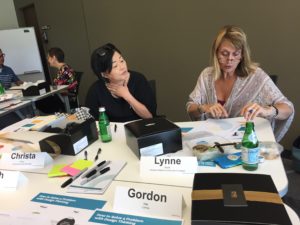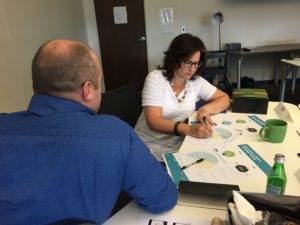Carizon Family and Community Services’ mission is to help children, youths and families thrive in the Region of Waterloo.
The Kitchener-based non-profit organization accomplishes this through a wide variety of programs and services aimed at strengthening the mental health and overall wellbeing of its clients.
But in the social good world, new challenges and problems often arise making it difficult for many organizations to further their missions.
Carizon hopes to change this by taking part in Capacity Canada’s new Capacity by Design program. This new initiative will see representatives from the social good community take part in a five-day design sprint in September using the human-centred approach of design thinking to solve complex problems.
“It’s a whole different way of working,” said Carizon CEO Tracy Elop. “We just went through a strategic planning process, so we are in a very good place to do this.”
Elop hopes by taking part in the Capacity by Design (www.capacitybydesign.ca) program her organization can now move this planning process forward and identify potential issues.
“The challenge is how to define a problem in such a way that it’s manageable,” she said.
Identifying a specific problem is a key component of the Capacity by Design program.
Hugh Munro, retired Wilfrid Laurier University marketing professor and one of Capacity by Design’s key designers, said many non-profit and for-profit organizations are facing increasing challenges through digitization and globalization that need addressing.
“There are all kinds of issues that you face, forcing you to perhaps question the model that you have and rethink what it is that you’re doing. One of the ways to work through these complex challenges is design thinking,” he told a group of social good representatives at a ‘lunch and learn’ event held Aug. 24 at the Capacity Canada office in Waterloo.
Liz Dennis, designer on the Capacity by Design team, said the ‘lunch and learn’ events have become a valuable way to introduce the social good community to the program.
“They are intended to be a teaser; to get people interested in learning more,” she said, noting Carizon is the first organization to officially sign on after Elop attended a ‘lunch and learn’ in June.
Additional ‘lunch and learns’ are in the works this fall that may focus on the problem-framing aspect of the Capacity by Design program.
Dennis said there are several other organizations ‘in the pipeline’ who are interested in the program following that June event.
“I feel like in this project things are going to move very fast,” she said.
Work on Capacity by Design, which is being done in partnership between Capacity Canada and Overlap Associates in Kitchener, began in March thanks to a $417,940 grant from the Lyle S. Hallman Foundation to cover the costs of the first year of the program. The foundation has committed a total of $1.1 million over four years.
The first year of funding will see experts from Overlap Associates, a leader in design thinking, work onsite with the Capacity by Design team, teaching them to become experts on the subject. In turn, they will share their new knowledge over the next few years with other social good leaders in several phases.
“What we want is to create the capacity for design thinking and create design leaders across Canada,” said Dennis.
A total of 40 design sprints are planned, with six taking place in the first year which ends in April 2019. Of that six, one will be offered to a group outside the region. The first, featuring representatives from Carizon, kicks off Sept. 10.
Dennis outlined the process for those in attendance at the recent lunch and learn, explaining that thoroughly framing a problem before the sprint begins is the first major step.
During the week-long sprint, which includes participation from a variety of representatives from the organization, she said many potential solutions should surface.
She said the process will result in a solution, or solutions, that can be prototyped and tested.
“It’s a very active and involving process,” said Dennis.
She said the process continues after the sprint ends as Capacity by Design leaders provide participants with ongoing mentorship and coaching in effort to support the organization’s cultural shift towards the use of design thinking.
“We are learning right along with you,” Dennis told those at the lunch and learn.
Elop said Carizon has ‘dabbled’ in design thinking in the past and has always found it to be a valuable method to create new solutions.
“Design thinking gets to the heart of making sure you’re providing things people want and need, not guessing what their needs are,” she said.
Elop said at least nine representatives from her organization will be taking part in the sprint.
“Everybody’s views will be considered,” she said. “No idea is a bad idea.”
Besides generating new ideas, Elop hopes that by taking part in the sprint Carizon participants should be able to incorporate some of the things they learn into their everyday work.
“There’s good learning for everyone involved,” she said.
Munro agrees.
“A lot of stuff in business is to tweak what we already know, and we end up with just a modest enhancement of yesterday’s solutions,” he said. “Whereas design thinking breaks you out of that. It allows you to be creative.”
For more information about Capacity by Design, contact Hugh Munro ([email protected]), or Liz Dennis ([email protected]).

